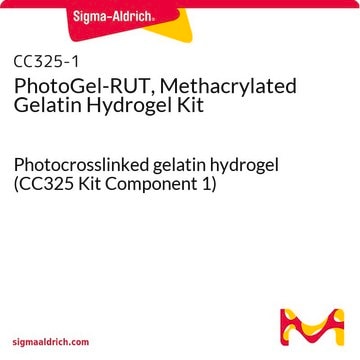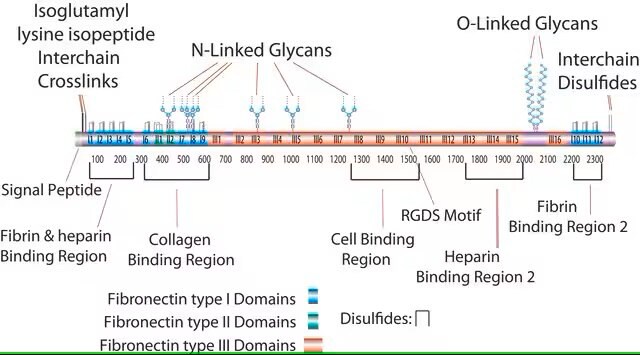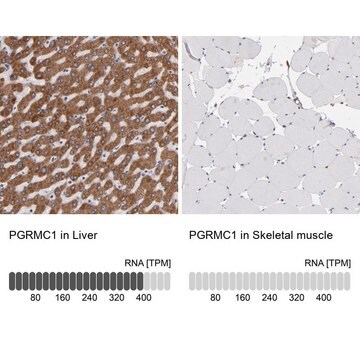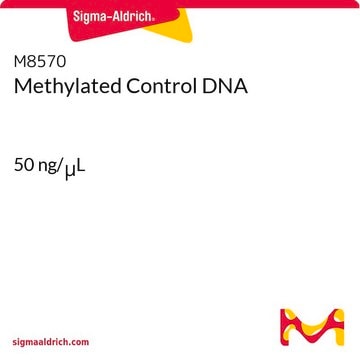935786
Shear-thinning gelatin-based photocrosslinkable bioink

suitable for extrusion-based 3D bioprinting
Synonym(s):
EASYGEL INX
Sign Into View Organizational & Contract Pricing
All Photos(1)
About This Item
UNSPSC Code:
12352201
Recommended Products
Quality Level
form
(transparent gel)
viscosity
0.1-1 Pa.s (high shear)
200-2500 Pa.s low (shear)
gel strength
(Storage modulus after UV crosslinking (kPa) 2-6)
General description
The shear-thinning gelatin-based bioink is a extracellular matrix (ECM)- mimicking ink that provides all the benefits of gelatin with the addition of shear thinning behaviour, thereby allowing easy printing at 37°C.
Based on gelatin derived from natural collagen, this bioink has been modified with photocrosslinkable functional groups which enables unpreedneted printing efficiency of a scaffold that resembes the natural ECM and has exptionally high cell viabilities. The shear-thinning gelatin-based bioink combines all the benefits of conventional gelatin or GelMA with the improved printability thanks to its shear thinning behavior. It can be printed at 37°C in the presence or absence of cells, and overcomes the narrow processing range limitations associated with printing conventional GelMA based bioinks. After printing, the material can be photocrosslinked, resunting in a physiologically stable hydrogel.
Processing:
At high shear rates, this bioink exhibits a low viscotiy which allows easy injection from the printing nozzle, At low shear rates, it has a high viscosity, which is required for shape retention after deposition. This is favorable for extrusion-based 3D bioprinters as the ink should easily be injected through the printing nozzle and the post-injetion flow should be minimized to prevent structural deformation. These properties are very rarely seen in conventional gelatin-based ink, giving this bioink an advantage over traditional bioinks.
Based on gelatin derived from natural collagen, this bioink has been modified with photocrosslinkable functional groups which enables unpreedneted printing efficiency of a scaffold that resembes the natural ECM and has exptionally high cell viabilities. The shear-thinning gelatin-based bioink combines all the benefits of conventional gelatin or GelMA with the improved printability thanks to its shear thinning behavior. It can be printed at 37°C in the presence or absence of cells, and overcomes the narrow processing range limitations associated with printing conventional GelMA based bioinks. After printing, the material can be photocrosslinked, resunting in a physiologically stable hydrogel.
Processing:
At high shear rates, this bioink exhibits a low viscotiy which allows easy injection from the printing nozzle, At low shear rates, it has a high viscosity, which is required for shape retention after deposition. This is favorable for extrusion-based 3D bioprinters as the ink should easily be injected through the printing nozzle and the post-injetion flow should be minimized to prevent structural deformation. These properties are very rarely seen in conventional gelatin-based ink, giving this bioink an advantage over traditional bioinks.
Application
Applications: :
3D bioprinting
Tissue engineering
In vitro modeling
3D bioprinting
Tissue engineering
In vitro modeling
Features and Benefits
Features and Benefits:
- Easy printing - Shear thinning behavior enables easy deposition at 37°C
- Biodegradability - Enables cellular remodeling of the printed matrix
- Easy handling - Delivered in a ready-to-use cartridge - UV curable
- Efficient UV-based crosslinking
- Reproducibility - Strict quality control
Cell interactive - Material is biocompatible mimics natural ECM envrionment
- Easy printing - Shear thinning behavior enables easy deposition at 37°C
- Biodegradability - Enables cellular remodeling of the printed matrix
- Easy handling - Delivered in a ready-to-use cartridge - UV curable
- Efficient UV-based crosslinking
- Reproducibility - Strict quality control
Cell interactive - Material is biocompatible mimics natural ECM envrionment
Storage Class Code
10 - Combustible liquids
WGK
WGK 3
Flash Point(F)
Not applicable
Flash Point(C)
Not applicable
Choose from one of the most recent versions:
Certificates of Analysis (COA)
Lot/Batch Number
Don't see the Right Version?
If you require a particular version, you can look up a specific certificate by the Lot or Batch number.
Already Own This Product?
Find documentation for the products that you have recently purchased in the Document Library.
Olivier Guillaume et al.
Acta biomaterialia, 165, 72-85 (2022-03-16)
Since its inception, tissue engineering and regenerative medicine (TERM) has been relying on either scaffold-based or scaffold-free strategies. Recent reports outlined the possibility of a synergistic, convergence approach, referred to as the third TERM strategy, which could alleviate bottlenecks of
Our team of scientists has experience in all areas of research including Life Science, Material Science, Chemical Synthesis, Chromatography, Analytical and many others.
Contact Technical Service








